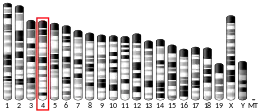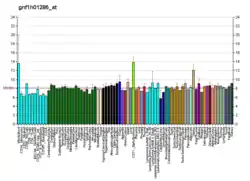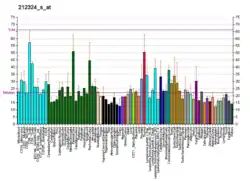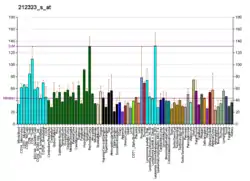VPS13D
Vacuolar protein sorting-associated protein 13D is a protein that in humans is encoded by the VPS13D gene.[5]
| VPS13D | |||||||||||||||||||||||||||||||||||||||||||||||||||
|---|---|---|---|---|---|---|---|---|---|---|---|---|---|---|---|---|---|---|---|---|---|---|---|---|---|---|---|---|---|---|---|---|---|---|---|---|---|---|---|---|---|---|---|---|---|---|---|---|---|---|---|
| Identifiers | |||||||||||||||||||||||||||||||||||||||||||||||||||
| Aliases | VPS13D, vacuolar protein sorting 13 homolog D, SCAR4 | ||||||||||||||||||||||||||||||||||||||||||||||||||
| External IDs | OMIM: 608877 MGI: 2448530 HomoloGene: 15583 GeneCards: VPS13D | ||||||||||||||||||||||||||||||||||||||||||||||||||
| |||||||||||||||||||||||||||||||||||||||||||||||||||
| |||||||||||||||||||||||||||||||||||||||||||||||||||
| |||||||||||||||||||||||||||||||||||||||||||||||||||
| |||||||||||||||||||||||||||||||||||||||||||||||||||
| Wikidata | |||||||||||||||||||||||||||||||||||||||||||||||||||
| |||||||||||||||||||||||||||||||||||||||||||||||||||
This gene encodes a protein belonging to the vacuolar-protein-sorting-13 gene family. In yeast, vacuolar-protein-sorting-13 proteins are involved in trafficking of membrane proteins between the trans-Golgi network and the prevacuolar compartment.
While several transcript variants may exist for this gene, the full-length natures of only two have been described to date. These two represent the major variants of this gene and encode distinct isoforms.[5]
References
- GRCh38: Ensembl release 89: ENSG00000048707 - Ensembl, May 2017
- GRCm38: Ensembl release 89: ENSMUSG00000020220 - Ensembl, May 2017
- "Human PubMed Reference:". National Center for Biotechnology Information, U.S. National Library of Medicine.
- "Mouse PubMed Reference:". National Center for Biotechnology Information, U.S. National Library of Medicine.
- "Entrez Gene: VPS13D vacuolar protein sorting 13 homolog D (S. cerevisiae)".
Further reading
- Andersson B, Wentland MA, Ricafrente JY, et al. (1996). "A "double adaptor" method for improved shotgun library construction". Anal. Biochem. 236 (1): 107–13. doi:10.1006/abio.1996.0138. PMID 8619474.
- Yu W, Andersson B, Worley KC, et al. (1997). "Large-Scale Concatenation cDNA Sequencing". Genome Res. 7 (4): 353–8. doi:10.1101/gr.7.4.353. PMC 139146. PMID 9110174.
- Seki N, Ohira M, Nagase T, et al. (1998). "Characterization of cDNA clones in size-fractionated cDNA libraries from human brain". DNA Res. 4 (5): 345–9. doi:10.1093/dnares/4.5.345. PMID 9455484.
- Nakayama M, Kikuno R, Ohara O (2003). "Protein–Protein Interactions Between Large Proteins: Two-Hybrid Screening Using a Functionally Classified Library Composed of Long cDNAs". Genome Res. 12 (11): 1773–84. doi:10.1101/gr.406902. PMC 187542. PMID 12421765.
- Strausberg RL, Feingold EA, Grouse LH, et al. (2003). "Generation and initial analysis of more than 15,000 full-length human and mouse cDNA sequences". Proc. Natl. Acad. Sci. U.S.A. 99 (26): 16899–903. Bibcode:2002PNAS...9916899M. doi:10.1073/pnas.242603899. PMC 139241. PMID 12477932.
- Ota T, Suzuki Y, Nishikawa T, et al. (2004). "Complete sequencing and characterization of 21,243 full-length human cDNAs". Nat. Genet. 36 (1): 40–5. doi:10.1038/ng1285. PMID 14702039.
- Gerhard DS, Wagner L, Feingold EA, et al. (2004). "The Status, Quality, and Expansion of the NIH Full-Length cDNA Project: The Mammalian Gene Collection (MGC)". Genome Res. 14 (10B): 2121–7. doi:10.1101/gr.2596504. PMC 528928. PMID 15489334.
- Velayos-Baeza A, Vettori A, Copley RR, et al. (2005). "Analysis of the human VPS13 gene family". Genomics. 84 (3): 536–49. doi:10.1016/j.ygeno.2004.04.012. PMID 15498460.
- Gregory SG, Barlow KF, McLay KE, et al. (2006). "The DNA sequence and biological annotation of human chromosome 1". Nature. 441 (7091): 315–21. Bibcode:2006Natur.441..315G. doi:10.1038/nature04727. PMID 16710414.
This article is issued from Wikipedia. The text is licensed under Creative Commons - Attribution - Sharealike. Additional terms may apply for the media files.






